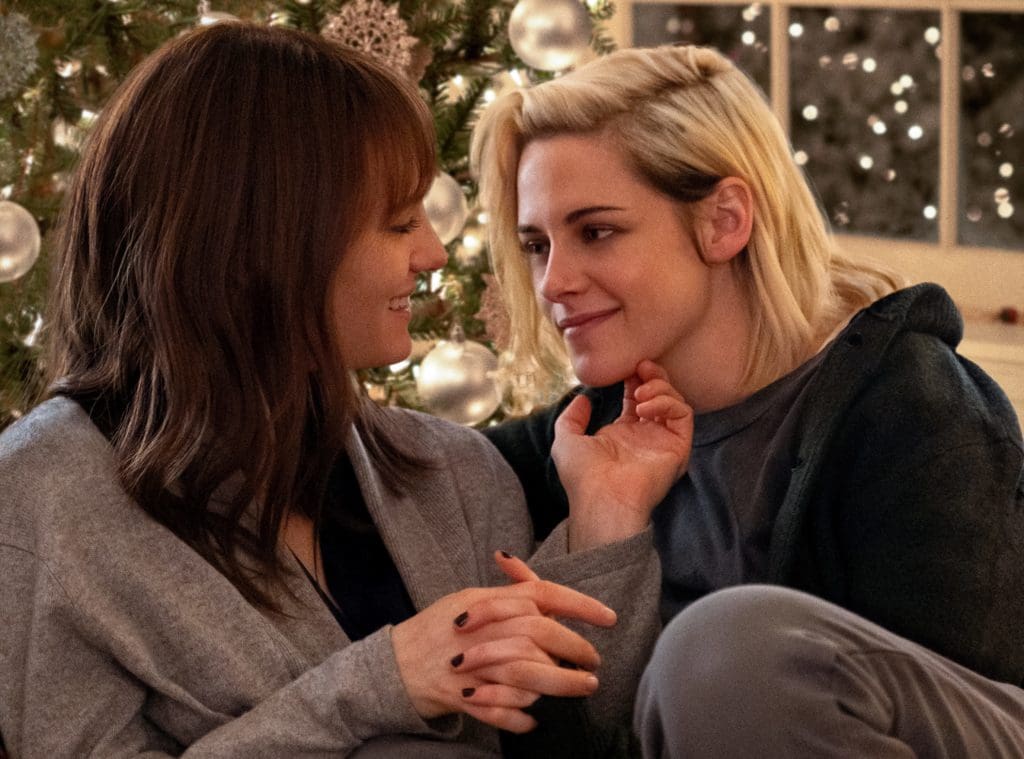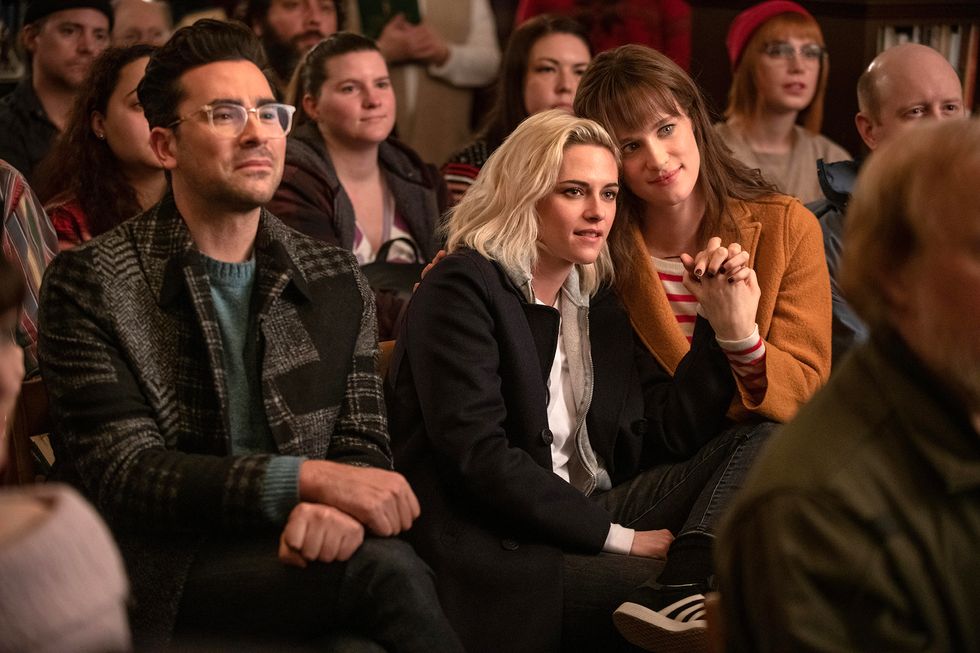Kristen Stewart’s Happiest Season is more stressful than the title implies, but good moments do shine through
Kristen Stewart's widely anticipated LGTBQ+ rom-com, which focuses on a F/F couple over the Christmas holidays, is actually much more stressful to watch than the feel-good title implies.
Who would have predicted in 2008, when Twilight was first released, that the actress playing Bella Swan would go on to become a gay icon and end up starring in the first LGBTQ+ Christmas rom-com backed by a major Hollywood studio? Not a lot of us, I’m sure.
There’s a lot to look forward to in Sony’s Happiest Season, and most of it does come in the form of Kristen Stewart playing a queer character that she seems fully comfortable inhabiting. To back that up, it’s co-written and directed by Clea DuVall, a lesbian creator, and the movie’s supporting cast includes the likes of Dan Levy and Aubrey Plaza. It is a queer movie by a queer creator and with actual queer actors in it, which is a step in the right direction for Hollywood.
The trailer debuted to much excitement, and personally, I was counting down the days until release. But after finishing the movie, it became apparent that the trailer did something that movie trailers sometimes tragically do: it promises a different movie than the one viewers actually receive.
Not that Happiest Season isn’t a good movie – it has many excellent moments – but perhaps it should be called Stress Season when considering how much drama and angst and stress it contains for the heroine, Abby, and the viewers by extension. I came for a happy queer Christmas story, and at first, I seemed to be getting everything I had wished for . . . and then the narrative took a turn that plonked me into a minefield of angst. I know the narrative needed an obstacle for the heroine to overcome, but if I wanted an LGBTQ+ Christmas film with a side of intense drama, I would’ve gone and watched Carol (which is a favourite, admittedly) instead.
Most of the frustrations one has with the movie can be neatly pinned down to one thing: Harper, Abby’s girlfriend (played by Mackenzie Davis). People’s mileage will vary with her, and some will empathise more with her struggle of not being able to come out to her family more than others. As Dan Levy’s character says, everyone’s coming out story is different, and once you say those magic words, you can’t go back. Coming out stories are important, but equally so are the stories of queer joy. This story tries to be both but somehow gets bogged down in the details.

What made me want to shake Harper was the way she cast Abby, the girl she supposedly loved, adrift into the sea of white suburban middle-class America. Imagine taking your wonderful (and very attractive) girlfriend back to your hometown and not wanting to show her the cutest indie coffee places whilst searching for the most bizarre Christmas gifts? Couldn’t be me, but it is Harper apparently. There are tiny details that give credibility to Harper and Abby’s relationship – they have matching necklaces, and there’s the fabled brief hand brush amongst other subtle signs – but on a first watch, these are easily missed. There’s never a cute scene of the two of them together doing Christmassy stuff to make the audience feel truly invested in their relationship. It isn’t as if hanging out with Abby would put a sign above Harper’s head saying ‘hello I am homosexual’.
Instead, Harper sticks with her family – which does make sense, considering how her own struggle is to do with trying to be a ‘perfect daughter’ for them – and then, for some reason, her bland ex-boyfriend Connor. Honestly, why would you when your hot girlfriend played by K-Stew exists? Abby is left to fend for herself, and it’s no surprise she strikes up a friendship with Aubrey Plaza’s stunningly fabulous character Riley, who has also been mistreated by Harper (Harper outed her in high school, which is something I cannot forgive). It is really nice to see such a friendship between two queer women, but they do also have excellent chemistry and this cannot be denied. In a different time, one where Hollywood is happy to fund and create more than one kind of LGBTQ+ love story, Happiest Season might have been a different movie with different leads. But for now, Abby x Riley lies in the realm of fanfic.

But Clea DuVall does get some things right. She wanted Kristen Stewart as her leading character. And then she clearly gave a thumbs up to the incredibly gay suit choices for Abby, a blessing I know many of us are thankful for. DuVall also gives Kristen Stewart space to demonstrate her own unique brand of humour, which I’ve always quite liked, and the script does include some very good comedic dialogue. (My favourites? “What are you doing in the closet?”, “You stay out of this, Sappho” and “Have they ever met a lesbian?”)
Other good things in the movie come in the form of Dan Levy’s character John, who plays the role of Abby’s best friend. He is the true MVP of the movie, and his little fish subplot elicited a laugh. He was given excellent scenes, and his speech about the myriad of ways one can come out will relate to many. In fact, between Riley and John, the best relationships Abby has in this film are the friendships she has with fellow openly queer characters.
As the first LGBTQ+ Christmas film made by a leading Hollywood studio, Happiest Season easily masquerades as a groundbreaking film. Yet a closer look reveals the way it comfortably stays within its lane – which is clearly why Hollywood decided it was okay to make. It has a predominantly white cast, it is set in quaint and picturesque suburban America, and it has the ‘happy ever after’ of the outliers being accepted into the family fold.
But despite that, the fact is this: I want Happiest Season to do well so that Hollywood makes more LGBTQ+ films of all kinds. I want the coming-out films, the Christmas films, the Valentines films, the feel-good rom-coms, the action thrillers – I want them all. (I also want Kristen Stewart to play more queer leads.) At the moment, Hollywood only seems comfortable with making LGBTQ+ films that have a facet of queer struggle to them – the coming-out films, the trauma films, the stories where they don’t get together in the end. But if ‘happy’ queer films such as Happiest Season do well, more and more queer creators will trickle in and begin to make stories that uplift us rather than making us shake our heads in disappointment and ship the lead with someone more deserving of her. These stories already exist in books and in independent films, but slowly they are being ushered into the mainstream. And maybe one day the stories shared by Hollywood will be more inclusive and innovative, and we will be all the better for it.
Happiest Season is available to rent or buy now on Amazon UK or Hulu.


